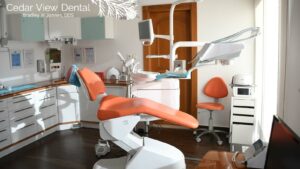A dentist who specializes in the diagnosis and treatment of periodontal disease is known as a periodontist. They can help their patients in preventing gum disease by carrying out routine dental cleanings.
Cedar View Dental are the leaders in providing periodontal care to Edmonds and Lynnwood, WA. Here’s a brief introduction to periodontistry, how it might be part of your overall dental health, and how we can help.
What happens at a visit to the periodontist?

Your dental and medical history will be examined when you first see our periodontist at Cedar View Dental. After that, we’ll check for gumline recession, examine your gums, and assess your bite. The depths of periodontal pockets can be determined using a probe. X-rays allow us to see the bone below the gum-line.
How do you know if you have gum disease?
A few typical indications of gum disease include:
- Pain or sores in the mouth
- Swollen, red, or tender gums
- Bleeding while using the toothbrush or floss
- Tooth sensitivity
- Bad breath
- Loose or separating teeth
- Gum recession
It’s important to be aware that untreated periodontal disease can result in serious health issues. Early detection is made possible by routine dental cleanings and exams. When gum disease is discovered in the gingivitis stage, it can be treated and reversed.
How does periodontal disease progress?
Periodontal disease has four stages, from mild to severe:
1. Gingivitis
Plaque accumulation at or near the gumline is the primary cause of this early stage of periodontal disease. It may progress to the following stage if untreated. Since it hasn’t yet attacked bones, this is the only stage that can be reversed.
2. Minor Periodontal Disease
The bone and fibers supporting tooth roots are both affected by the second stage of periodontal disease. Once the infection has spread to stage two, the bone is already being destroyed by the infection. At this point, the teeth and gums can be deep cleaned using scaling and root planing.
3. Moderate Periodontal Disease
In this stage, the periodontal pockets are deeper, allowing the bacteria to more aggressively attack the bones and bloodstream.
4. Advanced Periodontal Disease
The bone that supports the teeth has been severely deteriorated by bacteria at this stage. Periodontal surgery using the PerioLase MVP-7 TruePulse is necessary. Deep pockets contaminated with bacteria are cleaned using it.
Treatment of Gum Disease
The gum disease treatment option we select for our patients at Cedar View Dental, will depend on how rapidly the disease is progressing in their gums and how severe it is. Among the more common periodontal treatments we use are:
- Dental cleanings involving the removal of plaque and tartar from both above and below the gumline.
- Scaling and root planing, a deep-cleaning, nonsurgical procedure is done with local anesthesia.
- Flap surgery/pocket reduction surgery. If gum disease has progressed, surgery may be necessary. Your dentist lifts your gums during this procedure, and removes the tartar.
- Bone grafts can replace bone that has been lost due to gum disease. They can be made from the patient’s own bone, donated bone, or synthetic bone.
- LANAP® laser gum surgery is a less invasive treatment for patients who might not be able to endure the alternative surgery.
Get Gum Disease Treatment as Soon as You Can
As you can see, it’s crucial to see a periodontist specialist as soon as you suspect you have gum disease. Schedule an appointment today with Cedar View Dental in Lynnwood, WA, to learn more about periodontal procedures.